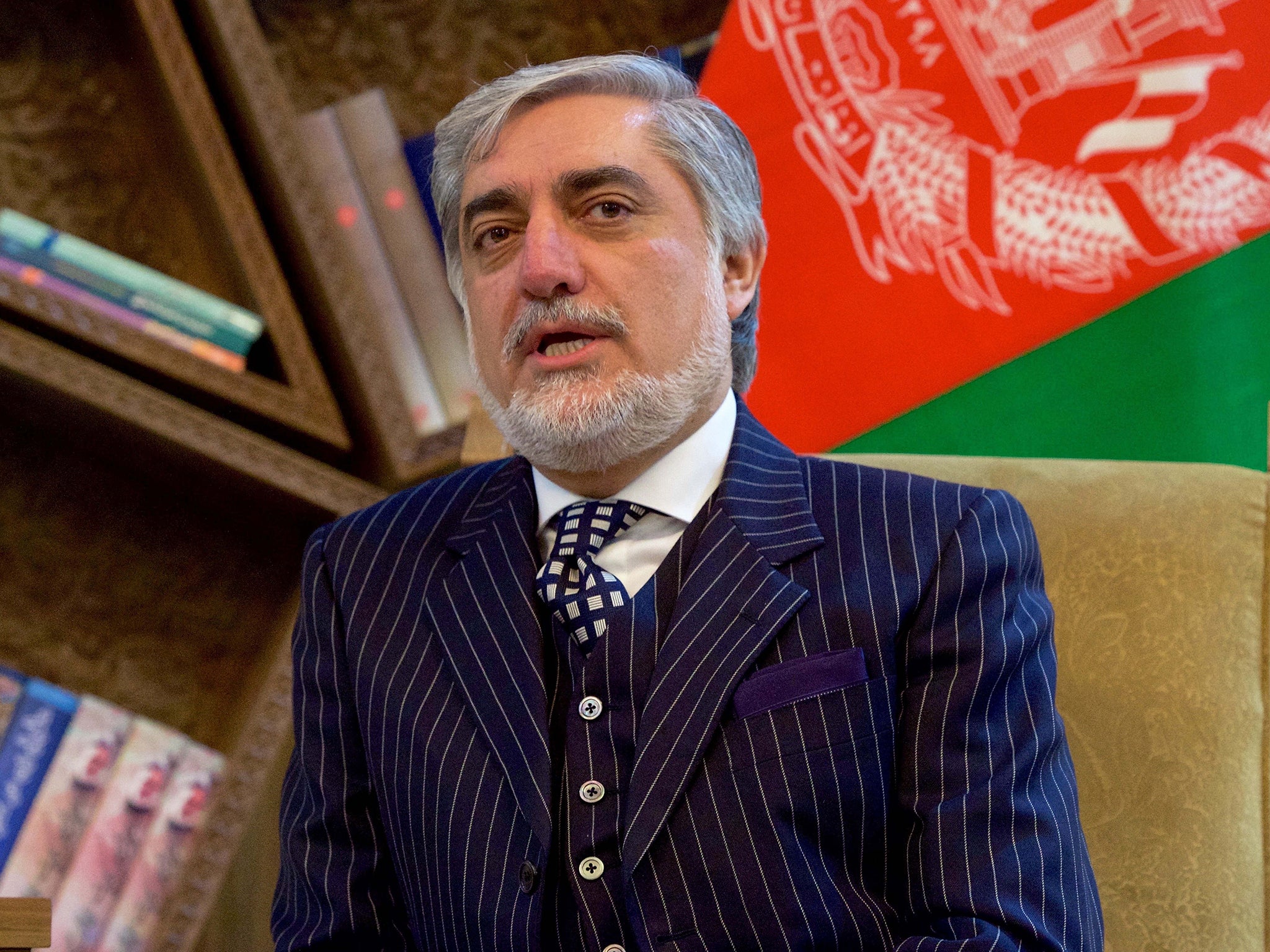Afghan leader calls for renewed military aid to prevent Taliban resurgence: ‘We cannot afford to make the same mistake again’
His comments come ahead of a Nato meeting where the UK and others are expected to announce plans to send additional forces to the country

Afghanistan needs the renewed long-term military and political support of the international community to combat a violent insurgency threatening the stability of the whole region, one of the country’s leaders has stressed on a visit to London.
The Afghan government’s chief executive, Abdullah Abdullah, was speaking as Western states, including Britain, prepared plans to send additional forces to his country.
That plan comes after US President Donald Trump recently called for Nato to help the US mission there, engaged in a conflict which has seen an increasing presence of Isis and al-Qaeda, as well as the Taliban.
Dr Abdullah, who is in a power-sharing administration with Afghan President Ashraf Ghani, is due to meet Theresa May, the prime minister, and her foreign secretary Boris Johnson on Thursday.
He praised the contribution made by Britain since the fall of the Taliban regime in 2001 “not just in defence, but also in forming civic society and public institutions. It is a country which has stood by us and made great sacrifices.”
Speaking of the 12 years of UK deployment which followed, he added: “Were the great sacrifices of the British forces made in vain? I don’t think so: they helped to prevent the whole region from slipping into chaos.”
New strategies being put in place by the Afghan government with Western help include the expansion of the air force, doubling the size of the special forces and setting up a territorial army (TA) from local communities.
British SAS and SBS – naval special forces – units have been in action in the country since the withdrawal of the US-led international forces at the end of 2013, while members of the UK’s TA played a significant part during the British deployment in Helmand.
At a Nato defence ministers’ meeting, which began in Brussels on Wednesday, Secretary General Jens Stoltenberg said: “Allies and partners are stepping up – with forces and funding – in Afghanistan,” adding that around 3,000 more trainers will be sent to the mission and “discussions were underway to extend funding for the Afghan forces beyond 2020”.
The ministers will focus on Afghan commitment in the final session of the meeting.
Detailed proposals are due to be presented at the Nato summit, attended by Mr Trump, in the second week of July.
All the Taliban and their backers in the region needed to do was make sure that they avoided engagement with Nato for those years and prepare to come back after that and restart their violent campaign
The US president will fly to the UK, his first visit since arriving at the White House, directly from the Brussels meeting, when he will meet Ms May to discuss the bilateral “special relationship” and have tea with the Queen.
The additional Afghan commitment by Britain is expected to take place at the Nato summit. There are around 600 UK personnel in the country at present, most involved in training and providing logistical support, and up to another 700 may be sent with more of them, including additional special forces, engaged in combat.
There are currently around 15,000 US troops deployed in Afghanistan and some progress has been made under its commander General John Nicholson.
US planners hold that additional forces are needed and Mr Trump wants Nato allies to provide them.
The longer-term strategy of the US, however, remains unclear, with an administration in Washington which has been marked by constantly changing senior personnel and shifting positions.
Lieutenant General HR McMaster, who as Mr Trump’s national security advisor anchored the Afghan policy, has been replaced by John Bolton, who is more focused on Iran and North Korea.
War artists in Afghanistan
Show all 6There is also uncertainty about interaction with regional powers. Mr Trump had taken a harder approach with Pakistan – whose military and secret police have been accused of colluding with the Taliban and other insurgent groups – than his predecessors.
But moves such as Mr Trump’s freezing of up to $2bn in military aid has not led to the Pakistanis taking any significant measures against the insurgents, and the White House is said to be considering other punitive measures such as visa bans on individual members of the military and the secret police (ISI), and permanently cutting off the flow of military aid.
However, there is doubt that the tough policies will be followed up with the regularly changing focus of the Trump administration’s foreign policy.
Dr Abdullah said he fully appreciated that it was up to individual states to decide whether they wanted to deploy forces to Afghanistan and what form that would take.
The need he wanted to stress was for long-term commitment, pointing out the harm done when it was announced in 2011 that international forces would pull out in three years.
“All the Taliban and their backers in the region needed to do was make sure that they avoided engagement with Nato for those years and prepare to come back after that and restart their violent campaign,” he said.
“We cannot afford to make the same mistake again.”
Subscribe to Independent Premium to bookmark this article
Want to bookmark your favourite articles and stories to read or reference later? Start your Independent Premium subscription today.

Join our commenting forum
Join thought-provoking conversations, follow other Independent readers and see their replies